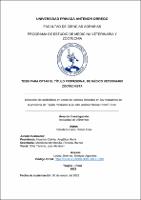| dc.contributor.advisor | López Jiménez, Enrique Aguberto | |
| dc.contributor.author | Caballero Cano, Víctor Elías | |
| dc.creator | Caballero Cano, Víctor Elías | |
| dc.date.accessioned | 2023-03-03T15:04:10Z | |
| dc.date.available | 2023-03-03T15:04:10Z | |
| dc.date.issued | 2023 | |
| dc.identifier.uri | https://hdl.handle.net/20.500.12759/10384 | |
| dc.description.abstract | Los antibióticos constituyen una valiosa herramienta en el control de enfermedades
en los animales de producción, sin embargo, estos pueden constituirse en una seria
amenaza para la salud de los consumidores si es que no se toman los controles
respectivos de su uso para evitar la presencia de sus residuos en los alimentos de
origen animal. Esta investigación tuvo como objetivo demostrar la existencia de
residuos de antibióticos mediante la prueba Premi®Test en canales bovinas
beneficiadas en los mataderos Municipales de La Esperanza, El Porvenir y el
Matadero Privado San Francisco, Salaverry de la Provincia de Trujillo – Perú. De
una población de 2 650 vacunos faenados mensuales, se muestrearon 93, las
mismas que fueron analizadas en el laboratorio Microclin S.R.L. incubando los
agares pre sembrados con el Bacillus estearothermophilus var calidolactis a 64ºC,
dando como resultado que el 62.4% arrojaron resultados positivos y el 37.6% fueron
negativos, que discriminadas por matadero evidencian que en el matadero de La
Esperanza el 77.8%, en El Porvenir 60.9% y Salaverry 60.7% fueron positivas a
residuos de antibióticos respectivamente, en un nivel de significancia del 5%.
Concluyendo que la presencia de residuos de antibióticos en las canales bovinas,
evidenciada en el presente trabajo, son motivo de preocupación pues está
afectando seriamente la inocuidad alimentaria ya que si consumes una carne de
vacuno macho, criollo, proveniente de la sierra con una edad de 2 a 4 años podrías
estar consumiendo un alimento con residuos de antibióticos, según el estudio
realizado. | es_PE |
| dc.description.abstract | Antibiotics are a valuable tool in the control of diseases in production animals,
however, they can become a serious threat to the health of consumers if the
respective controls of their use are not taken to avoid the presence of antibiotics. its
residues in food of animal origin. The objective of this research was to demonstrate
the existence of antibiotic residues through the Premi®Test test in bovine carcasses
benefited in the Municipal slaughterhouses of La Esperanza, El Porvenir and the
San Francisco Private Slaughterhouse, Salaverry in the Province of Trujillo - Peru.
From a population of 2,650 cattle slaughtered monthly, 93 were sampled, the same
ones that were analyzed in the Microclin S.R.L. laboratory. incubating the pre seeded agars with Bacillus stearothermophilus var calidolactis at 64ºC, resulting in
62.4% giving positive results and 37.6% negative, which, discriminated by
slaughterhouse, show that 77.8% in the La Esperanza slaughterhouse, in El
Porvenir 60.9% and Salaverry 60.7% were positive for antibiotic residues
respectively, at a significance level of 5%. Concluding that the presence of antibiotic
residues in bovine carcasses, evidenced in the present work, are cause for concern
since it is seriously affecting food safety since if you consume a male, Creole beef,
coming from the mountains with an age of 2 to 4 years you could be consuming a
food with antibiotic residues, according to the study carried out | en_US |
| dc.description.uri | Tesis | es_PE |
| dc.format | application/pdf | es_PE |
| dc.language.iso | spa | es_PE |
| dc.publisher | Universidad Privada Antenor Orrego | es_PE |
| dc.relation.ispartofseries | T_VETE_173 | |
| dc.rights | info:eu-repo/semantics/openAccess | es_PE |
| dc.rights.uri | https://creativecommons.org/licenses/by/4.0/ | es_PE |
| dc.source | Universidad Privada Antenor Orrego | es_PE |
| dc.source | Repositorio Institucional - UPAO | es_PE |
| dc.subject | Antibióticos | es_PE |
| dc.subject | Carne | es_PE |
| dc.title | Detección de antibióticos en carne de bovinos faenados en los mataderos de la provincia de Trujillo mediante la prueba antimicrobiana Premi®-Test | es_PE |
| dc.type | info:eu-repo/semantics/bachelorThesis | es_PE |
| thesis.degree.level | Título Profesional | es_PE |
| thesis.degree.grantor | Universidad Privada Antenor Orrego. Facultad de Ciencias Agrarias | es_PE |
| thesis.degree.name | Médico Veterinario Zootecnista | es_PE |
| thesis.degree.discipline | Medicina Veterinaria y Zootecnia | es_PE |
| dc.subject.ocde | https://purl.org/pe-repo/ocde/ford#4.03.00 | es_PE |
| renati.advisor.orcid | https://orcid.org/0000-0003-1841-1038 | es_PE |
| renati.author.dni | 70920884 | |
| renati.advisor.dni | 26679486 | |
| renati.type | https://purl.org/pe-repo/renati/type#tesis | es_PE |
| renati.level | https://purl.org/pe-repo/renati/level#tituloProfesional | es_PE |
| renati.discipline | 841056 | es_PE |
| renati.juror | Huamán Dávila, Angélica María | |
| renati.juror | Mendoza Mendocilla, Roxana Marisol | |
| renati.juror | Ortiz Tenorio, Luis Abraham | |
| dc.publisher.country | PE | es_PE |


